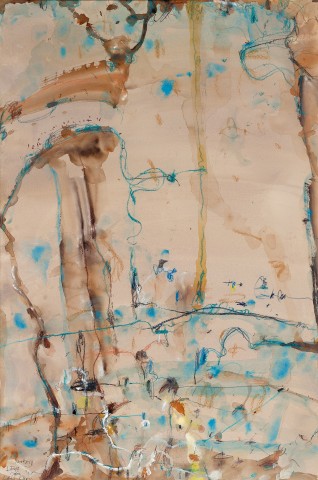ROOKERY, LAKE EYRE, 2001
JOHN OLSEN
mixed media on paper on canvas
121.5 x 80.5 cm
signed and inscribed with title lower left: Rookery / L. Eyre / John / Olsen
Tim Olsen Gallery, Sydney
Private collection, Sydney, acquired from the above in December 2001
Figures and Landscape: Recent works on paper, Tim Olsen Gallery, Sydney, 15 December 2001 – 2 February 2002, cat. 35 (Illus. exhibition catalogue.)
McGregor, K., and Zimmer, J., John Olsen: Journeys Into the You Beaut Country, Thames and Hudson, Melbourne, 2016, pp. 249 (illus.), 340
For many artists, there is a motif to which they return at numerous points in their career, reinterpreting and drawing new inspiration. For Sidney Nolan, it was Ned Kelly; for Paul Cezanne, Mont Sainte-Victoire. For John Olsen, the motif is Lake Eyre. Its significance is such that Patrick McCaughey has described it as being central to 'four decades of Olsen's Dreaming'.1 'I've been nearly drowned on the blessed lake when our boat sank in a sudden storm; nearly been sucked under by the quicksand-like treacherous black mud; nearly been blown away by winds that howl in at midnight, buffeting your tent; I've had desert sand blow into my eyes, my paint, the camp oven, and ruin my beautiful fish paellas ... but all in all, I've had a fabulous time there.’2
Located 700 kilometres north of Adelaide, Olsen first visited Lake Eyre in October 1974 in the company of naturalist Vincent Serventy. They had journeyed to see the lake's largest flood in 500 years, an experience which profoundly affected the artist's way of interpreting his world. 'The lake might be viewed as an unconscious plughole of Australia, a mental landscape... Because it is 13 metres below sea level - and perhaps nowhere in Australia does one have the feeling of such complete emptiness - covered by a bowl of endless sky with inviting silences, there is, as you stand on the edge of the lake, a feeling that you are standing on the edge of a void.’3
Like the artist Ian Fairweather, who he greatly admired, Olsen was fascinated by Chinese art and literature. With Rookery, Lake Eyre 2001 he presents a perfect encapsulation of their interpretation of the void as evoking the concept of 'everything and nothingness', 'a place for contemplation, a vast, engulfing space.’4 Set on a highly tilted plane that may be viewed on a macro and micro level, the composition teems with birdlife - their busy flight paths reminiscent of the trails behind Whiteley’s ferries. As Olsen himself observes, 'There's a lot happening in my pictures. I take a multi-perspective approach on the one canvas, I'm down on the ground one moment and up flying the next, or looking sideways or underneath, because that's the way the world is today.’5
1. McCaughey, P., Why Australian Painting Matters, The Miegunyah Press and Text Publishing, Melbourne, 2014, p. 236
2. Hawley, J., 'John Olsen', Encounters with Australian Artists, University of Queensland Press, Queensland, 1993, p. 134
3. Olsen, J., 1975 cited in Hart, D., John Olsen, Craftsman House, Sydney, 2000 (revised edition), p. 133
4. Hart, D., ibid., p. 135
5. Janet Hawley, op. cit., p. 129
ANDREW GAYNOR
